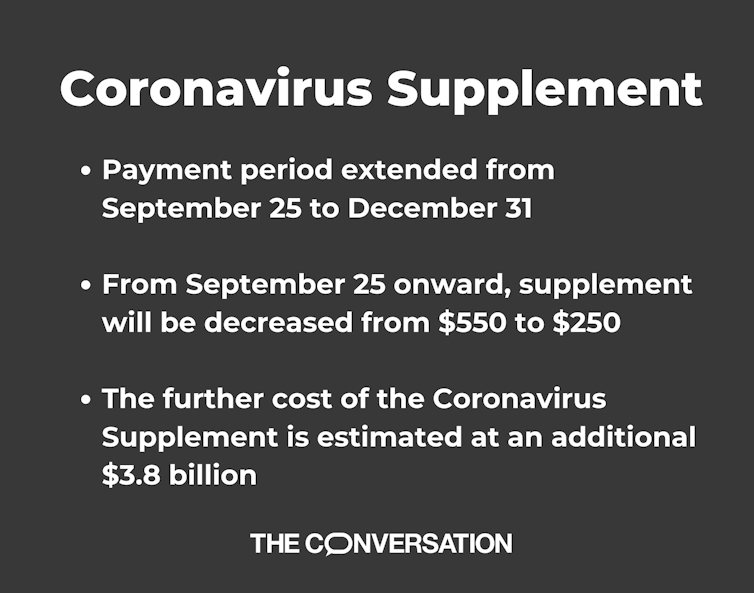Those on JobKeeper will get $1,200 a fortnight from September 28 to January 3, with a lower rate of $750 if they worked less than 20 hours a week in February.
The full payment will fall to $1,000 a fortnight from early January, remaining until March 28. The second tier rate will fall to $650.
The present rate is $1,500 a fortnight for all recipients.
From late September, an unemployed person on the basic payment will go from receiving $1,115.70 a fortnight to $815.70.
Under the changes, those on JobSeeker will be able to earn up to $300 a fortnight compared with the present $106 before their income support is tapered.
“We will make further decisions about JobSeeker closer to the end of the year or potentially even in the [October] budget,” Scott Morrison said.
He acknowledged some elevated support will be needed into the new year.
“We need to make those decisions closer to the time, to have a better understanding of where the economy is at – remembering the JobSeeker arrangements has more an impact on incentives on the labour market. JobKeeper does not have those same disincentives,” he said.
“But I want to be very clear – I am leaning heavily into the notion that we would anticipate, on what we know right now, that there obviously would need to be some continuation of the COVID supplement post-December.”
The revisions to JobKeeper and JobSeeker, announced by Morrison and Treasurer Josh Frydenberg, recognise a continuing financial floor is vital while starting to wean businesses and individuals off the present levels of payments as the economy transitions.
The revision comes amid great uncertainty given the second COVID wave in Victoria, with that state on Tuesday announcing a tally of 374 new COVID cases and three more deaths.
The government has not changed the basic JobSeeker (unemployment) rate, although Morrison, under questioning at his news conference, did not rule out this being done later.
The existing higher JobKeeper and Coronavirus Supplement rates will remain until late September.
Tougher eligibility conditions will mean businesses will have to show the required turnover reduction to remain in the JobKeeper scheme.
Employers will have to demonstrate the turnover falls (30% for businesses with turnover under $100 million, 50% for larger ones) in the June and September quarters to be eligible for the December quarter payment.
They will again need to reassess their eligibility for the March quarter payment, showing they have had the relevant falls in the June, September and December quarters.
The number of people on JobKeeper, which has been supporting some 3.5 million workers, will reduce substantially under the new arrangements and as the economy improves. Frydenberg said Treasury estimated about 1.4 million people would remain eligible in the December quarter and one million in the March quarter.
Those on JobSeeker will have mutual obligation requirements reintroduced. From August 4 people will have to reconnect with employment services and undertake four job searches a month. They will be obliged to accept a job that has been offered through this process. There will be a higher rate of job search from the end of September.

The extension of JobKeeper will cost an estimated $16.6 billion on top of the earlier estimated $70 billion. The Coronavirus Supplement extension is costed at $3.8 billion.
Shadow treasurer Jim Chalmers said: “Labor is inclined to support what the Government has announced when it comes to JobKeeper.”
The Australian Industry Group said the new two-tiered JobKeeper payment “is a sensible adoption of the New Zealand wage subsidy approach”
It would “go a long way to sharpening the work incentives that were dampened by the flat rate of JobKeeper in the initial phase.
“While the phase-down of the amount of the subsidy will put more pressure on businesses, it is a fiscally responsible move and will help businesses transition to a greater degree of self-reliance in these extreme economic circumstances.”
The St Vincent de Paul Society questioned the different timeframes for the extension of JobKeeper and JobSeeker, and the reintroduction of mutual obligation requirements for JobSeeker.
“At the end of the day, COVID affects everyone and both those payments should be in place till the end of March. It’s not clear why the JobSeeker arrangements have only been extended to December this year,” CEO Toby oConnor said.
This article is republished from The Conversation under a Creative Commons license. Read the original article.
Get the latest from The Adelaide Review in your inbox
Get the latest from The Adelaide Review in your inbox